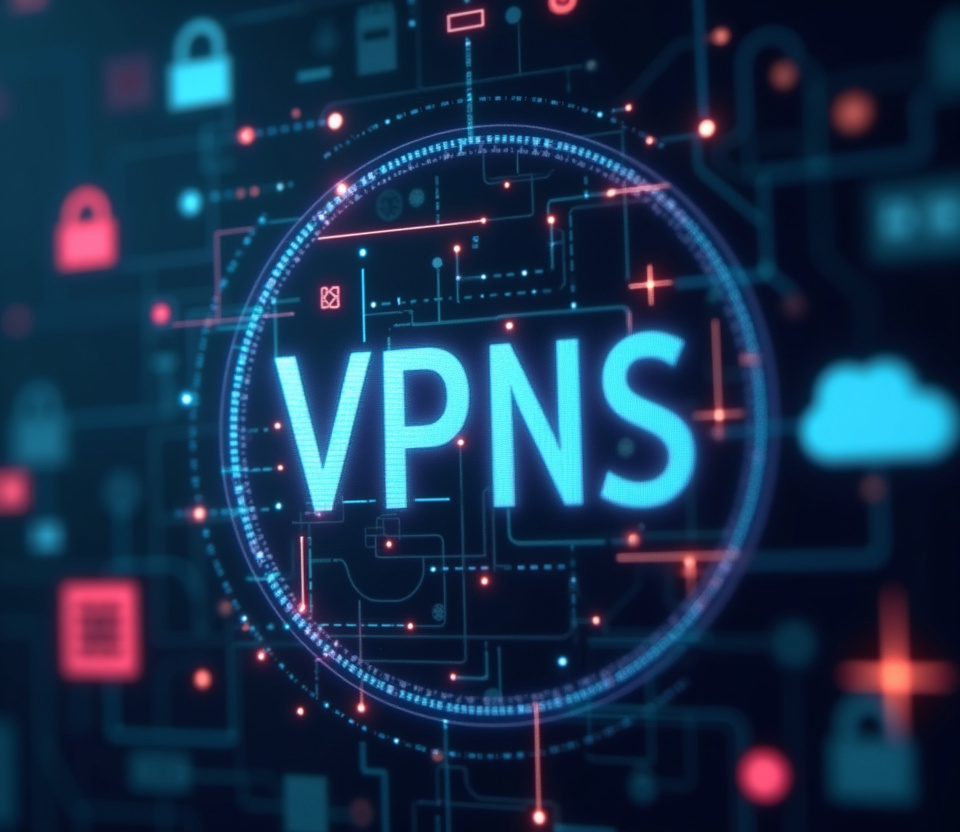VPNs for Tech Startups: Securing Business Innovations

Table of Contents
tech startup VPN
In today's hyper-competitive landscape, tech startups face immense pressure to innovate rapidly and disrupt established markets. However, this pursuit of groundbreaking ideas and cutting-edge technologies makes them prime targets for cyber threats. From intellectual property theft to data breaches, the risks are multifaceted and can cripple a nascent business before it even gains traction.
A robust security strategy is no longer an optional extra but a fundamental requirement for survival. This is where the strategic implementation of a emerges as a vital tool. More than just a means of encrypting internet traffic, a VPN offers a comprehensive security layer that safeguards sensitive data, protects against espionage, and fosters a secure environment for innovation.
For a tech startup, hinges on the ability to collaborate effectively and share information seamlessly, often across geographically dispersed teams. However, traditional network infrastructures are often vulnerable to eavesdropping, man-in-the-middle attacks, and other forms of cyber intrusion. A VPN establishes an encrypted tunnel between a startup's devices and the internet, effectively masking its online activity and preventing unauthorized access to sensitive data.
This encryption is crucial for protecting everything from confidential emails and financial records to proprietary code and design schematics. Furthermore, a VPN can help startups circumvent geographical restrictions and access resources that might otherwise be unavailable. For , a VPN offers a crucial line of defense against industrial espionage.
Startups often work on projects that are highly confidential and represent significant investments of time and resources. Competitors or malicious actors might attempt to infiltrate a startup's network to steal valuable . A VPN makes it significantly more difficult for such attacks to succeed by encrypting all data transmitted over the network and masking the startup's IP address, making it harder to track and target.
Startups involved in can ensure their code repositories, testing environments, and communication channels are protected against unauthorized access and tampering. This is particularly important when collaborating with external developers or using cloud-based development tools. By implementing a VPN, startups can create a secure and isolated development environment, minimizing the risk of data leaks and ensuring the integrity of their code.
Beyond simple encryption, the right VPN solution offers a suite of advanced security features, including malware protection, intrusion detection, and data loss prevention. These features provide an additional layer of defense against evolving cyber threats and help startups maintain a strong security posture. The selection of appropriate VPN protocols, such as OpenVPN or WireGuard, is also vital to maintaining strong security.
Regular security audits and penetration testing can then confirm the integrity of the VPN setup. A robust VPN implementation should include not only the technical aspects of the configuration but also robust training programs for employees, making them aware of the importance of using the VPN and how to recognize potential security threats. It is important that everyone be informed about phishing campaigns and to treat odd messages with scrutiny.
Clear policies on the use of public Wi-Fi, the handling of sensitive data, and what to do in case of a security incident are crucial. A culture sensitive to security needs to permeate the internal team so that the use of the VPN gets embraced. Furthermore, for the VPN to be effective it needs to integrate seemlessly with other security measures.
This can include firewalls, intrusion detection systems, and multi-factor authentication. The different layers of security must work together to provide a comprehensive defense against attacks. It is important for the security setup to scale with the rapid growth of the startup.
As quickly as a startup establishes its position the need for more robust security grows. The initial VPN setup must be capable to handle an increasing number of users, new applications, and expanding network infrastructure. Scaling requires investing into a VPN solution that is adaptable and can easily integrate with cloud services.
The chosen VPN can also play a key role in data compliance management. Startups must adhere to the data security regulations of the region they want to grow into, securing data access regardless of the user location by using tools to ensure compliance. Ultimately, a well-implemented tech startup VPN creates a secure foundation that underpins all aspects of a startup's operations, from product development to marketing and sales.
This not only protects the startup's valuable assets but also fosters a culture of security awareness among employees, making them more vigilant against potential threats.
intellectual property
For innovative tech startups, securing is paramount to their future success. Their innovative ideas, proprietary algorithms, and unique designs are their competitive edge, and any compromise can have devastating consequences. within a startup needs to extend beyond simply locking doors and using strong passwords.
A crucial element of any comprehensive intellectual property protection strategy is implementing a robust solution. This VPN acts as a secure gateway, safeguarding sensitive data during transmission and preventing unauthorized access to vital internal resources. Consider the scenario of remote collaboration, a common practice in many tech startups.
Developers, designers, and engineers dispersed across different locations need secure channels to share code, discuss design concepts, and access confidential project files. Without a VPN, this data is vulnerable to interception and theft, especially when transmitted over public Wi-Fi networks. A VPN encrypts all traffic between the remote worker and the startup's network, creating a secure tunnel that shields the information from prying eyes.
This encryption ensures that even if an attacker manages to intercept the data, it will be unreadable without the proper decryption key. Beyond remote access, a provides a secure environment for coding, testing, and deploying applications. Startups often rely on cloud-based platforms and third-party services for their development needs, and these environments may not always be adequately protected.
A VPN adds an extra layer of security by encrypting all traffic between the startup's development environment and the external services, preventing unauthorized access and data leaks. This is particularly important when dealing with sensitive customer data or compliance-related information. Protecting requires a multi-layered approach, and a VPN is a critical component of that strategy.
Startups should implement the VPN in conjunction with other security measures, such as strong passwords, multi-factor authentication, and regular security audits. It is also essential to train employees on how to use the VPN properly and to be aware of the potential risks of connecting to unsecured networks. The benefits of a tech startup VPN extend beyond simply protecting intellectual property.
It can also improve employee productivity by providing secure and reliable access to company resources from anywhere in the world. This allows employees to work remotely without compromising security, fostering flexibility and collaboration. Access control is another key capability to leverage.
The VPN solution can operate alongside access control tools to restrict access to certain IPs. Such an approach is necessary to limit unauthorized access and protect sensitive resources such as code repositories, design specifications and financial data. The combination of a robust VPN and access control is the first step towards a comprehensive data security strategy.
Data leakage prevention (DLP) mechanisms are vital for identifying and preventing sensitive data from leaving the corporate network. DLP systems work in conjunction with VPNs to monitor data traffic and identify potential breaches. When a VPN encrypts data transmissions, DLP systems still analyze the contents for policy violations and can take actions such as blocking the transfer.
In practice, this means that if an employee accidentally attempts to share confidential information outside of the VPN's secure tunnel, the DLP system detects it and prevents the action. The selection of VPN server locations also plays a critical role in intellectual property protection. Startups may choose to route their traffic through servers located in countries with strong data privacy laws, providing an extra layer of legal protection for their intellectual property.
Consideration also needs to be given to the jurisdictional aspects of data security for the VPN servers and to comply with agreements made with clients and suppliers. In short, the initial investment of time and resources to implement a tech startup VPN is far outweighed by the potential costs of intellectual property theft or data breaches. By prioritizing security from the outset, startups can create a foundation for sustainable growth and protect their valuable innovations.
business innovation security
In the fast-paced world of technology, is a constant race against evolving cyber threats. Tech startups, with their limited resources and focus on rapid development, often face significant challenges in building a robust security infrastructure. A is a crucial tool for bridging this gap and providing a cost-effective way to protect their sensitive data and innovative projects.
A VPN can obscure their IP address. This process provides some anonymity, but it should not be considered a replacement for privacy-focused tools. When analyzing if the VPN can be a solution also evaluate legal and policy implications as well as what the data it collects contains.
Startups should consider implementing logging and monitoring mechanisms to track suspicious activity. This should happen in conjunction with the VPN setup. All generated logs should be actively analized.
For example, if the analyses discover unusual traffic pattern, the security team can investigate and take immediate action to prevent potential attacks. Another essential component of a strategy is regular security assessments. Periodic external audits can assess the overall security posture and identify vulnerabilities that may have been overlooked.
Startups should also conduct penetration testing to simulate real-world attacks and evaluate the effectiveness of their security measures. These assessments can help startups stay ahead of the curve and proactively address potential security risks. For , a VPN allows startups to establish secure connections to external resources.
Startups can securely access necessary sources without exposing their internal network to potential threats. Many startups embrace cloud-based development environments to facilitate collaboration and accelerate development cycles. A VPN can establish a secure tunnel between the startup's network and the cloud environment, preventing unauthorized access and ensuring data confidentiality.
This is particularly important when dealing with sensitive source code, design documents, or customer data. It may also be necessary to implement data segmentation, which means segregating the network into segments. Startups that handle financial transactions and health information can use data segmentation to isolate sensitive data from other parts of the network, complying with data regulations.
Network segregation requires careful planning and configuration, and the VPN plays a central role in achieving secure segmentation. When adopting a , the selected solution must support a wide array of platforms. Startups should assess the different operating systems and devices being used in the team and ensure that the VPN is compatible, offering a consistent experience for all users.
Some of the VPN solutions allow to configure specific access controls, limiting access to critical system components that would normally not be accessed by non-technical staff. Staff training includes informing employees to always look for the 'lock' icon in the browser toolbar to see if the website uses SSL to securely encrypt the traffic. Similarly, the address of the website should start with "HTTPS" rather than "HTTP".
By providing practical advice during tutorials, the users may begin to actively protect the . Startups should follow a holistic and proactive approach. It is important to balance the technology with people and processes to ensure the protection of valuable R&D assets and create a security environment that fosters innovation, without the fear of cyber threats.
Ultimately they need a VPN to protect them from industrial espionage, protect customer data when using cloud-based development environments and protect against data loss.
tech startup VPN
Selecting the right solution is a critical decision that requires careful consideration of several factors. It's not simply about choosing the cheapest or most popular option; it's about finding a solution that aligns with the specific needs and priorities of the startup, particularly concerning and long-term growth. One of the primary considerations is the level of encryption offered by the VPN.
Startups should look for solutions that use strong encryption protocols, offering features that include secure hashing algorithms. Avoid outdated or weak protocols, as they can be easily cracked, leaving data vulnerable. The geographic distribution of VPN servers is another important factor.
Startups should choose a provider with a global network of servers, allowing them to access resources from different regions and bypass geo-restrictions. The broader variety of the available servers allows the startup the flexibillity of choosing the region where they will connect to, which can bypass some govermental restrictions regarding the use of code, algorithms or products. This is very important for cases where requires it.
Also, the logs must be secured, which in turn gives extra layer of security to the . Before deploying the VPN, evaluate the logs and their storage location. The policies and procedures must respect the law as well.
Another important aspect to consider is VPN's performance. A VPN must not severely impact internet speeds or cause latency issues. Prior to deploying the VPN for the whole team test different VPN servers performace, evaluate the impact and ensure the performance will not be hurt.
As startups grow, their VPN needs evolve, so choosing a scalable solution is essential. Look for a provider that offers flexible plans and can easily accommodate additional users and devices. In practical terms, a also should implement security alerts, such as suspicious login activity.
The VPN should alert stakeholders and prompt action. All this can avoid security breaches. Before deploying the VPN, the team must evaluate the VPN protocol options, such as L2TP or IPsec and understand the trade-offs between speed and security the selected protocol provides.
Startups must choose a solution that provide both strong security without affecting performance. For example, the WireGuard protocol is open source, and it is generally considered to offer good security and good speed. Startups must also think about budget constraints but should balance it with the need for adequate security.
There are freemium models, but the downside is that these models often come with limitations and the risk of having to provide data that may be later used or sold to third parties. Startups can consider starting with a free or low-cost plan and then upgrading to a premium plan as their and security needs expand. Another aspect to evaluate is customization, which can enhance the .
Startups must find solutions that allow granular control over settings and policies. This can ensure that the VPN perfectly aligns with the different departments in the startup, like the financial versus the R&D department. Startups must prioritize solutions that allows automation, especially for tasks such as deployment and configuration.
When the startup team grows it is essential to establish the standard configuration of systems. This automation reduces manual work, improves efficiency and reliability in VPN management. It is essential for business innovation security the evaluation by the staff of the selected VPN.
The staff should be informed about the value of the VPN and trained to use it correctly. Only with the collaboration of the different levels of the startup, the implemented VPN may contribute to the safety of the assets and information. Ultimately this evaluation is very important for the scaling processes.
Before the number of users of the VPN grows it is better to make improvements, if any. The VPN selected must scale up along with the increase in team members to ensure the innovation business process can be sustained.
tech startup VPN
Implementing a is not a one-time task but rather an ongoing process that requires continuous monitoring, maintenance, and adaptation to evolving threats. A successful implementation goes beyond simply installing the software; it involves establishing clear policies, training employees, and regularly assessing the VPN's effectiveness in safeguarding . One of the first steps in the implementation process is to define a comprehensive VPN usage policy.
This policy should outline who is authorized to use the VPN, what activities are permitted, and what security protocols must be followed. The policy should also address issues such as password management, data access controls, and acceptable use of company resources. Clear usage guidelines are important to guarantee the when using the VPN.
In this guidelines the VPN's purposes, what kind of data the VPN solution protects and the general behavior to be adopted should be explicit, so that everyone in technical and non-technical roles understands what the scope of it is in protecting the . In line with a usage policy, proper employee training is incredibly helpful. The training should cover the basics of VPN technology, how to connect to the VPN, and how to troubleshoot common issues.
Furthermore, employees should be educated about the importance of security and the risks associated with using unsecured networks. Regular awareness campaigns can help reinforce these messages and keep security top of mind. Establishing well known communication channels the staff may use to report suspicious sites is important as well to keep everyone aware of the latest phishing schemes.
Along the line with protecting it from outside, it is also beneficial to create secure and encrypted storages or network drives to store important files regarding the innovation. It may also be necessary to segment personnel by relevance - this means that people who deal with code are more likely to be in charge of protecting the than people from the marketing department. The VPN must adapt also to legal compliance, so it is important to monitor the VPN logs, evaluate its impact on performance and perform security audits.
If a potential security breach has been identified, it can be blocked by closing the VPN. By doing all of this, along with consulting the stakeholders about any problems with performance or any suspect activity, it can be guaranteed that the can be a sustained resource to protect the company. Beyond technical aspects, consider setting up monitoring and alerting system to track the VPN functionality.
Alerting system helps to proactively identify any issues with the VPN and respond faster to threats. Evaluate the system to ensure that it works properly. Periodic penetration testing helps to identify any breaches in security, such as unauthorized access to the system.
The implementation of a tech startup VPN creates a secure environment, but this isn't free from the need of constant change and monitoring to guarantee that the business is protected against future threads. By establishing security governance and continuous monitoring, maintenance, and adaptation a secure VPN can be achieved. The VPN must adapt and be scalable to support future growth as the number of users increases.
The VPN needs to evolve with the business, so that the intellectual property is protected, customer data isn't exposed and the development phase is guaranteed within a safety net. Over time, the VPN and its functions can become irrelevant when more effective tools or security measure has been created, but if constantly sustained with the actions described it will become a solid first line measure. Finally, it must not be seen as the only safety measure, but as a component of diverse components, such as code review, constant communication, threat evaluations, training sessions, and of course the constant backing of stakeholders and the team.
In conclusion, the commitment to innovation security provides value. This can be a crucial feature to investors. In essence, the implementation processes help guarantee that the adapts to the processes to protect the innovation and the business, guaranteeing that is scalable to the team and to any future security requirement.
Stay Updated
Get the latest VPN news, tips, and exclusive deals to your inbox.




